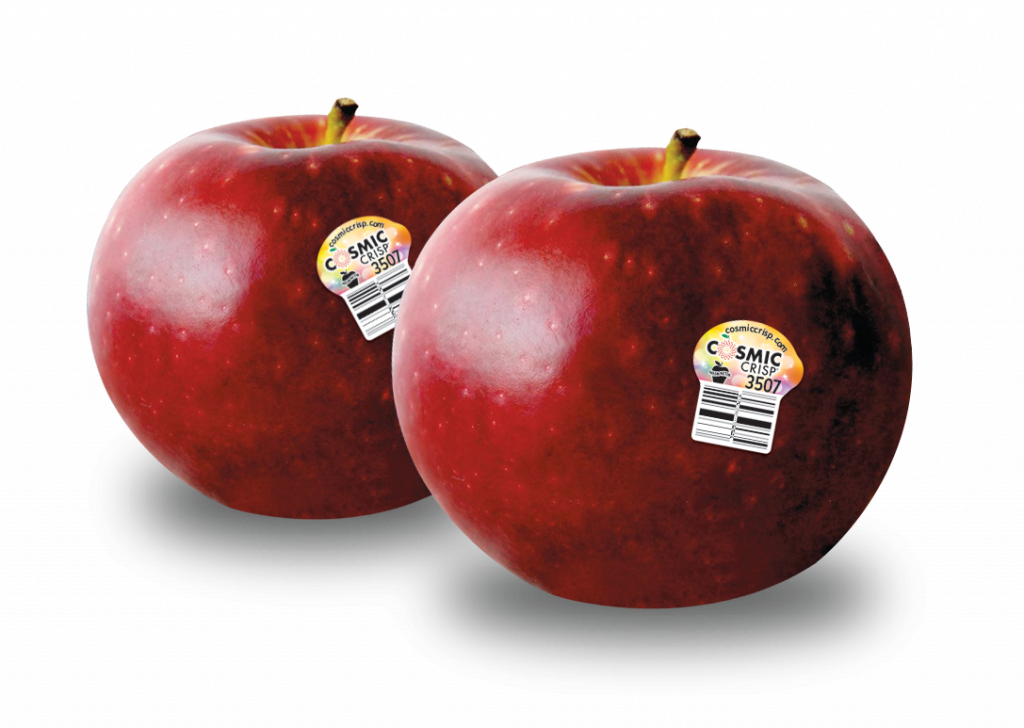
Taste Profile
The Cosmic Crisp® apple is remarkably crisp, sweet, sharp, tangy, and unbelievably juicy. As a cross between ‘Enterprise’ and ‘Honeycrisp’ apple varieties, it has a firm and crisp texture. This apple is terrific for eating out of hand, with ample sweetness and tartness. Its flesh does not brown easily, and the flavor and texture is maintained even through storage.
Visit cosmiccrisp.com to learn more…

Industry Resources
- Cosmic Crisp® Industry Guide – Login / Signup
- Apply for an Import License
- Link to the Cosmic Crisp® Packaging Guide
- Link to Cosmic Crisp® Packaging Files
- Grower Details WSU
- Fact Sheet
- Non-Exclusive Grower Agreement
- U.S. Farmgate Agreement
- Outline of NNII Policy Concerning Propagation and Sale of ‘WA 38’
- Cosmic Crisp® Grower FAQs
Licensed Providers
- Licensed Cosmic Crisp® Marketers
- Licensed Cosmic Crisp® Packing Facilities
- Licensed Cosmic Crisp® Packaging Providers
- Licensed Cosmic Crisp® Propagation Managers
Are you a backyard orchardist interested in growing Cosmic Crisp®? Please note: At this time Cosmic Crisp® is exclusive to Washington State for all of North America. Therefore, you must reside in Washington State to plant a WA38 tree. If you live in Washington State and wish to make a small-quantity tree purchase, please inquire with one of the nurseries below:
- Cloud Mountain Farm Center, Everson WA
- Scott’s Family Tree Nursery, Deer Park, WA
- Raintree Nursery, Morton, WA
- Maillard’s Landing Nursery Oak Harbor, WA
- Burnt Ridge Nursery Onalaska, WA
- Lael’s Moon Garden Nursery Rochester, WA
- Sky Nursery Shoreline, WA
- Valley Nursery Poulsbo, WA
- Garden Treasures Nursery & Organic Farm Arlington, WA
- New Dungeness Nursery Sequim, WA
- Swanson’s Nursery Seattle, WA
Email News
Receive news about this variety in your inbox. Just enter your email address below to subscribe. You can unsubscribe at any time. We will NOT share or sell your email with anyone.
Importing Cosmic Crisp®
A company that wishes to import Cosmic Crisp® WA 38 cv. apples from another country must hold a valid Import License issued by the commercialization company. The Import License communicates the proper usage of the trademark in commerce and establishes an agreement that the company will respect those conditions and endeavor to protect the trademark rights of the owner and stakeholders. Import Licenses are valid for the term of a crop year and must be renewed annually.
The Cosmic Crisp® Name
Naming the apple involved several meetings with focus groups around the state with sessions in Pullman, Yakima and Seattle. The “Cosmic” factor in the name was developed because of the “striking” lenticels on the apple surface. Those little spots look like starbursts to some and consumers are believed to be drawn to names relating to outer space and the cosmos. One of the outstanding attributes of the variety is its crisp texture. “Crisp” also links to its parent, ‘Honeycrisp’.
Timeline
1998-2000
Seeds were germinated and raised in a greenhouse in 1998 at the Washington State University (WSU) Tree Fruit Research and Extension Center, Wenatchee. The seedling was transferred to a collaborating commercial nursery in May 1998 where it grew until Sept. 1999, when it was budded onto M.9 rootstock.
2001-2004
The resulting tree was planted in the Phase 1 seedling evaluation orchard CV12 at WSU’s Columbia View orchard (row 16B, position 75) in Apr. 2001. Fruit from this original budded tree was evaluated in 2002 and 2003. Based on fruit quality, ‘WA 38’ was selected and advanced to Phase 2 evaluation in Oct. 2003. Buds were taken from the seedling tree and propagated onto M.9 rootstock in Sept. 2004.
2005-2008
Five trees were planted at each of three Phase 2 sites in central Washington in Apr. 2006. Additional trees were budded in 2006 onto M.9 rootstocks for larger scale Phase 3 plantings in 2008 at four commercial orchard sites in central Washington. ‘WA 38’ was virus-tested and certified material was budded onto virus-indexed vigorous rootstocks at nurseries for the production of State certified propagation material.
Since 2008, trees have been grown in four locations across Washington and evaluated for horticultural traits and storage behavior by Washington Tree Fruit Research Commission scientists Tom Auvil and Dr. Ines Hanrahan and WSU apple breeder Dr. Kate Evans, with the help of an industry advisory group.






